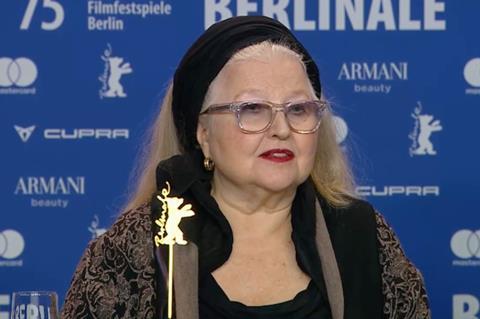
German actress Hanna Schygulla delivered a powerful criticism of nationalism and far-right party Alternative for Germany (AfD) at the Berlinale today (Wednesday, February 19).
“We have to get away from this nationalistic thing,” said Schygulla, speaking at the press conference for Ameer Fakher Eldin’s Competition title Yunan. “It has only brought tears, wars, people being abused. All this shouldn’t be at stake anymore.
“Now we have the worst people in charge of the world. I feel quite impotent,” continued Schygulla, in a speech that lasted around eight minutes. “Everything in life is in movement, so maybe they will move out at some time – I hope.”
Schygulla had specific criticism for Alice Weidel, co-chairwoman of AfD, with the party polling strongly ahead of the German government elections on Sunday, February 23, and immigration a key issue for many Germans.
“I heard [Weidel] on the radio today, talking about getting rid of all the foreigners that are bringing violence to our country,” said Schygulla. “As if you can say it. There’s so much violence [elsewhere] – look at femicides in every country in Europe. You cannot make a big fuss about some foreigners who flip out. You can, if you want to use them; but it’s not right.
“If you go back long enough in the history of everybody, we are all mixtures of something, of movements,” said Schygulla. “People have been always on the move. Not because they have a gypsy soul, but because there was the need to move.
“Let’s get out of this national identification,” continued the actress. “It has never been anything that was blessed. It has always brought misery, trouble, wars, feeding illusions of people who are dissatisfied with their life, that they become part of a glorious nation. It has always been lies and manipulation. We have to all be prepared to stand up against it.
“I’m very shattered by the uprising of the national thing again here in Germany. It’s everywhere unfortunately; in Germany it is still something connected to some catastrophe that’s not that far away [referencing the Second World War].”
The actress, who was born during the Second World War in 1943, also said that her mother named her after a Jewish friend of hers, who disappeared; and that her mother was always nervous about stating Hanna’s year of birth, as it came during Nazi rule.
Schygulla received applause from the press for her speech, which she said made “the hairs stand up” on her body. The actress is best known for her collaborations with German filmmaker Rainer Werner Fassbinder, including 1972’s The Bitter Tears Of Petra Von Kant and The Marriage Of Maria Braun, for which Schygulla won the Silver Bear for best actress at the 1979 Berlinale.
Two homes
Yunan is the second in a three-film trilogy for Eldin, who was born in Ukraine to Syrian parents, and now lives in Hamburg. The director said the topic of national identity arose in his first conversation with Schygulla.
“Home is wherever you feel at home, or that reminds you of home,” said Eldin. “The first time I met Hanna, she told me, ‘Why can’t someone have two homes?’. That’s a valid question.
“In order to have two homes, we have two choices: whether we continue to look at strangers as threats, or we let go, for our human experience, and enjoy our humanity together, and not label each other.”
Eldin closed out the press conference by citing a line from Theo Angelopoulos’s 1995 film Ulysses’ Gaze, a war drama loosely based on Homer’s epic poem The Odyssey.
“How many borders must we cross to reach home?” quoted Eldin. The director also hinted that he is at work on the third part of his trilogy, after 2021’s The Stranger and Yunan, but that he will “keep it unspoken” for now.
Prior to the press conference, Schygulla charmed photographers during the photocall, by launching into a rendition of The Platters’ 1954 hit ‘Only You’.
Yunan stars Georges Khabbaz as an exiled Arab writer who travels from Hamburg to a North Sea island to die by suicide, only to meet a devoted elderly woman who changes his perspective.
Intramovies handles sales, and sold the title to German-speaking territories among others this week. A co-production between Germany, Canada, Italy, Palestine, Qatar, Jordan and Saudi Arabia, its backers include Eurimages, Qatar’s Doha Film Institute and Saudi Arabia’s Red Sea Film Foundation.
The film has its world premiere at the Berlinale Palast this evening (Wednesday, February 19).






![The Brightest SunScreen[Courtesy HKIFF]](https://d1nslcd7m2225b.cloudfront.net/Pictures/274x183/3/5/0/1448350_thebrightestsunscreencourtesyhkiff_312678.jpg)


















No comments yet